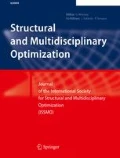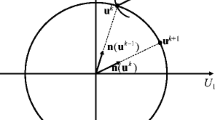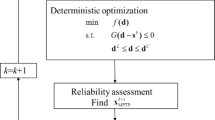Abstract
In this paper, intelligent initial point selection for performance measure approach (PMA) of reliability-based design optimization (RBDO) is proposed to improve computational efficiency of the most probable point (MPP) search. Unlike existing PMA algorithms concentrating on enhancement of the optimization algorithm for MPP search, the proposed method focuses on how to intelligently select an initial point which is close to the true MPP so that fast convergence can be achieved. Since the proposed method provides a new initial point for MPP search, it can be combined with any existing PMA algorithms. To obtain the initial point, the first-order Taylor series expansion with respect to a design vector is applied to MPP in U-space obtained from the previous RBDO iteration. Thus, the Jacobian matrix of the MPP vector with respect to the design vector is derived in an analytical way with no additional function evaluation. The derived Jacobian matrix is validated through numerical study. Comparative study with two existing initial point strategies for MPP search—the origin in U-space and the previous MPP in U-space under the condition of design closeness—shows that the proposed initial point significantly improves efficiency of MPP search in any PMA algorithm with various types of performance functions and input distributions.




Similar content being viewed by others
References
Breitung K (1984) Asymptotic approximations for multinormal integrals. J Eng Mech 110(3):357–366
Chatterjee T, Chowdhury R, Ramu P (2019) Decoupling uncertainty quantification from robust design optimization. Struct Multidiscip Optim 59(6):1969–1990
Chiralaksanakul A, Mahadevan S (2005) First-order approximation methods in reliability-based design optimization. J Mech Des 127(5):851–857
Deb K (2001) Multi objective optimization using evolutionary algorithms. John Wiley & Sons, New York
Ditlevsen O, Madsen HO (1996) Structural reliability methods, vol 178. Wiley, New York
Duan Z, Jung Y, Yan J, Lee I (2020) Reliability-based multi-scale design optimization of composite frames considering structural compliance and manufacturing constraints. Struct Multidiscip Optim. https://doi.org/10.1007/s00158-020-02517-3
Dubourg V, Sudret B, Bourinet JM (2011) Reliability-based design optimization using kriging surrogates and subset simulation. Struct Multidiscip Optim 44(5):673–690
Hasofer AM, Lind NC (1974) Exact and invariant second-moment code format. J Eng Mech Div 100(1):111–121
Hou GJW, Newman PA (2004) A most probable point-based method for reliability analysis, sensitivity analysis and design optimization. NASA CR 2004:213002
Hu W, Choi KK, Cho H (2016) Reliability-based design optimization of wind turbine blades for fatigue life under dynamic wind load uncertainty. Struct Multidiscip Optim 54(4):953–970
Jung Y, Cho H, Lee I (2019) MPP-based approximated DRM (ADRM) using simplified bivariate approximation with linear regression. Struct Multidiscip Optim 59(5):1761–1773
Keshtegar B, Lee I (2016) Relaxed performance measure approach for reliability-based design optimization. Struct Multidiscip Optim 54(6):1439–1454
Lee I, Choi KK, Du L, Gorsich D (2008) Inverse analysis method using MPP-based dimension reduction for reliability-based design optimization of nonlinear and multi-dimensional systems. Comput Methods Appl Mech Eng 198(1):14–27
Lee I, Choi KK, Gorsich D (2010) Sensitivity analyses of FORM-based and DRM-based performance measure approach (PMA) for reliability-based design optimization (RBDO). Int J Numer Methods Eng 82(1):26–46
Lee I, Choi KK, Noh Y, Zhao L, Gorsich D (2011) Sampling-based stochastic sensitivity analysis using score functions for RBDO problems with correlated random variables. J Mech Des 133(2):021003
Lee U, Kang N, Lee I (2019) Selection of optimal target reliability in RBDO through reliability-based design for market systems (RBDMS) and application to electric vehicle design. Struct Multidiscip Optim 60:949–963. https://doi.org/10.1007/s00158-019-02245-3
Lim J, Lee B, Lee I (2014) Second-order reliability method-based inverse reliability analysis using Hessian update for accurate and efficient reliability-based design optimization. Int J Numer Methods Eng 100(10):773–792
Lim J, Lee B, Lee I (2015) Sequential optimization and reliability assessment based on dimension reduction method for accurate and efficient reliability-based design optimization. J Mech Sci Technol 29(4):1349–1354
Lin PT, Gea HC, Jaluria Y (2011) A modified reliability index approach for reliability-based design optimization. J Mech Des 133(4):044501
Low BK, Tang WH (2007) Efficient spreadsheet algorithm for first-order reliability method. J Eng Mech 133(12):1378–1387
Meng Z, Li G, Wang BP, Hao P (2015) A hybrid chaos control approach of the performance measure functions for reliability-based design optimization. Comput Struct 146:32–43
Park JW, Lee I (2018) A study on computational efficiency improvement of novel SORM using the convolution integration. J Mech Des 140(2):024501
Periçaro GA, Santos SR, Ribeiro AA, Matioli LC (2015) HLRF–BFGS optimization algorithm for structural reliability. Appl Math Model 39(7):2025–2035
Rahman S, Xu H (2004) A univariate dimension-reduction method for multi-dimensional integration in stochastic mechanics. Probabilistic Eng Mech 19(4):393–408
Rao SS (2009). Engineering optimization: theory and practice. John Wiley & Sons
Rosenblatt M (1952) Remarks on a multivariate transformation. Ann Math Stat 23(3):470–472
Rubinstein RY, & Kroese DP (2016). Simulation and the Monte Carlo method (Vol. 10). John Wiley & Sons
Santosh TV, Saraf RK, Ghosh AK, Kushwaha HS (2006) Optimum step length selection rule in modified HL–RF method for structural reliability. Int J Press Vessel Pip 83(10):742–748
Shin J, Lee I (2015) Reliability analysis and reliability-based design optimization of roadway horizontal curves using a first-order reliability method. Eng Optim 47(5):622–641
Sun G, Zhang H, Fang J, Li G, Li Q (2017) Multi-objective and multi-case reliability-based design optimization for tailor rolled blank (TRB) structures. Struct Multidiscip Optim 55(5):1899–1916
Tu J, Choi KK, Park YH (1999) A new study on reliability-based design optimization. J Mech Des 121(4):557–564
Wu YT, Millwater HR, Cruse TA (1990) Advanced probabilistic structural analysis method for implicit performance functions. AIAA J 28(9):1663–1669 Ad
Yang D, Yi P (2009) Chaos control of performance measure approach for evaluation of probabilistic constraints. Struct Multidiscip Optim 38(1):83
Yoo D, Lee I, Cho H (2014) Probabilistic sensitivity analysis for novel second-order reliability method (SORM) using generalized chi-squared distribution. Struct Multidiscip Optim 50(5):787–797
Youn BD, Choi KK, Park YH (2003) Hybrid analysis method for reliability-based design optimization. J Mech Des 125(2):221–232
Youn BD, Choi KK, Du L (2005) Enriched performance measure approach for reliability-based design optimization. AIAA J 43(4):874–884
Acknowledgments
This research was supported by Energy Cloud R&D Program through the National Research Foundation of Korea (NRF) funded by the Ministry of Science, ICT (No. 2016006843) and the development of thermoelectric power generation system and business model utilizing non-use heat of industry funded by the Korea Institute of Energy Technology Evaluation and Planning (KETEP) and the Ministry of Trade Industry & Energy (MOTIE) of the Republic of Korea (No. 20172010000830).
Author information
Authors and Affiliations
Corresponding author
Ethics declarations
Conflict of interests
The authors declare that there is no conflict of interest.
Replication of results
Matlab codes for the proposed method are uploaded on https://github.com/Yongsu-Jung/SMO_Sensitivity.git. Overall concepts and algorithms can be validated through the mathematical example.
Additional information
Responsible Editor: Pingfeng Wang
Publisher’s note
Springer Nature remains neutral with regard to jurisdictional claims in published maps and institutional affiliations.
Rights and permissions
About this article
Cite this article
Jung, Y., Cho, H. & Lee, I. Intelligent initial point selection for MPP search in reliability-based design optimization. Struct Multidisc Optim 62, 1809–1820 (2020). https://doi.org/10.1007/s00158-020-02577-5
Received:
Revised:
Accepted:
Published:
Issue Date:
DOI: https://doi.org/10.1007/s00158-020-02577-5




